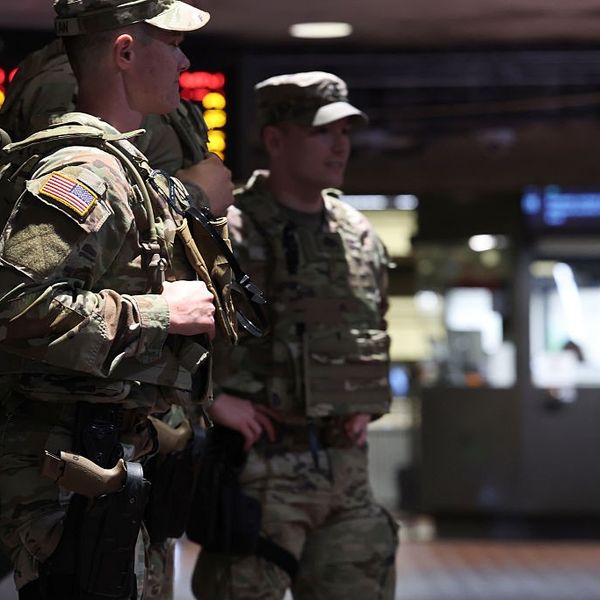
In this Monday, Nov. 28, 2011 file photo, Security forces gather at the scene of a suicide car bomb explosion in the town of Taji, about 12 miles (20 kilometers) north of Baghdad, Iraq. Late-night jailbreak attempts at two major prisons outside Baghdad have killed dozens, including at least 25 members of Iraq's security forces who battled militants armed with car bombs, mortars and machine guns, officials said Monday. (AP Photo/Hadi Mizban, File)
Assault on Iraq Prisons Allows Escape of Hundreds of Prisoners
Al Qaeda affiliates claim responsibility for brazen attack on two of countries largest prisons
Al-Qaeda affiliated groups in Iraq have claimed responsibility for coordinated attacks on two prisons in Iraq on Monday that allowed hundreds of prisoners to escape.
According to agency reports, the coordinated assaults on both the Taji and Abu Ghraib prisons involved multiple car bombs, were planned months in advanced, and were carried out by gunmen from outside with help, reportedly, from a number of guards on the inside.
Al-Jazeera reports:
The Ministry of Justice said 260 prisoners escaped from Abu Ghraib, on the western outskirts of Baghdad. Officials said yesterday 500 had originally been freed but security forces managed to recapture about 150 of them.
A manhunt is still under way for tens of inmates, including high-ranking al-Qaeda members, most of whom received death sentences.
Al Jazeera's Jane Arraf, reporting from Baghdad, said that this was the most serious challenge from al-Qaeda the government has faced in years.
"This is a group they thought they had dismantled," our correspondent said.
The attacks on the prisons came a year after al-Qaeda's Iraqi affiliate announced it would target the justice system.
Reuters adds:
Sunni Islamist militants have in recent months been regaining momentum in their insurgency against Iraq's Shi'ite-led government, which came to power after the U.S. invasion to oust Saddam Hussein.
"In response to the call of the mujahid (holy warrior) Sheikh Abu Bakr al-Baghdadi to seal the blessed plan of "Breaking the Walls"... the mujahideen brigades set off after months of preparation and planning to target two of the biggest prisons of the Safavid government," read the statement.
Safavid is a reference to the dynasty that ruled Iran from the 16th to 18th centuries and is used by hardline Sunnis as a derogatory term for Shi'ite Muslims.
___________________________
An Urgent Message From Our Co-Founder
Dear Common Dreams reader, The U.S. is on a fast track to authoritarianism like nothing I've ever seen. Meanwhile, corporate news outlets are utterly capitulating to Trump, twisting their coverage to avoid drawing his ire while lining up to stuff cash in his pockets. That's why I believe that Common Dreams is doing the best and most consequential reporting that we've ever done. Our small but mighty team is a progressive reporting powerhouse, covering the news every day that the corporate media never will. Our mission has always been simple: To inform. To inspire. And to ignite change for the common good. Now here's the key piece that I want all our readers to understand: None of this would be possible without your financial support. That's not just some fundraising cliche. It's the absolute and literal truth. We don't accept corporate advertising and never will. We don't have a paywall because we don't think people should be blocked from critical news based on their ability to pay. Everything we do is funded by the donations of readers like you. The final deadline for our crucial Summer Campaign fundraising drive is just days away, and we’re falling short of our must-hit goal. Will you donate now to help power the nonprofit, independent reporting of Common Dreams? Thank you for being a vital member of our community. Together, we can keep independent journalism alive when it’s needed most. - Craig Brown, Co-founder |
Al-Qaeda affiliated groups in Iraq have claimed responsibility for coordinated attacks on two prisons in Iraq on Monday that allowed hundreds of prisoners to escape.
According to agency reports, the coordinated assaults on both the Taji and Abu Ghraib prisons involved multiple car bombs, were planned months in advanced, and were carried out by gunmen from outside with help, reportedly, from a number of guards on the inside.
Al-Jazeera reports:
The Ministry of Justice said 260 prisoners escaped from Abu Ghraib, on the western outskirts of Baghdad. Officials said yesterday 500 had originally been freed but security forces managed to recapture about 150 of them.
A manhunt is still under way for tens of inmates, including high-ranking al-Qaeda members, most of whom received death sentences.
Al Jazeera's Jane Arraf, reporting from Baghdad, said that this was the most serious challenge from al-Qaeda the government has faced in years.
"This is a group they thought they had dismantled," our correspondent said.
The attacks on the prisons came a year after al-Qaeda's Iraqi affiliate announced it would target the justice system.
Reuters adds:
Sunni Islamist militants have in recent months been regaining momentum in their insurgency against Iraq's Shi'ite-led government, which came to power after the U.S. invasion to oust Saddam Hussein.
"In response to the call of the mujahid (holy warrior) Sheikh Abu Bakr al-Baghdadi to seal the blessed plan of "Breaking the Walls"... the mujahideen brigades set off after months of preparation and planning to target two of the biggest prisons of the Safavid government," read the statement.
Safavid is a reference to the dynasty that ruled Iran from the 16th to 18th centuries and is used by hardline Sunnis as a derogatory term for Shi'ite Muslims.
___________________________
Al-Qaeda affiliated groups in Iraq have claimed responsibility for coordinated attacks on two prisons in Iraq on Monday that allowed hundreds of prisoners to escape.
According to agency reports, the coordinated assaults on both the Taji and Abu Ghraib prisons involved multiple car bombs, were planned months in advanced, and were carried out by gunmen from outside with help, reportedly, from a number of guards on the inside.
Al-Jazeera reports:
The Ministry of Justice said 260 prisoners escaped from Abu Ghraib, on the western outskirts of Baghdad. Officials said yesterday 500 had originally been freed but security forces managed to recapture about 150 of them.
A manhunt is still under way for tens of inmates, including high-ranking al-Qaeda members, most of whom received death sentences.
Al Jazeera's Jane Arraf, reporting from Baghdad, said that this was the most serious challenge from al-Qaeda the government has faced in years.
"This is a group they thought they had dismantled," our correspondent said.
The attacks on the prisons came a year after al-Qaeda's Iraqi affiliate announced it would target the justice system.
Reuters adds:
Sunni Islamist militants have in recent months been regaining momentum in their insurgency against Iraq's Shi'ite-led government, which came to power after the U.S. invasion to oust Saddam Hussein.
"In response to the call of the mujahid (holy warrior) Sheikh Abu Bakr al-Baghdadi to seal the blessed plan of "Breaking the Walls"... the mujahideen brigades set off after months of preparation and planning to target two of the biggest prisons of the Safavid government," read the statement.
Safavid is a reference to the dynasty that ruled Iran from the 16th to 18th centuries and is used by hardline Sunnis as a derogatory term for Shi'ite Muslims.
___________________________

